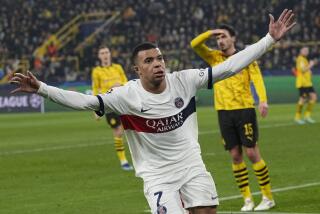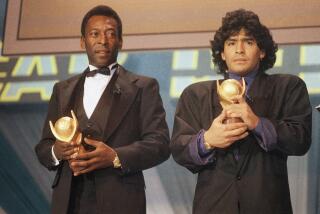THE MONEY PLAYER . . . : Diego Maradona : Can the Argentine Star Devalue Beckenbauer’s Deutsch Marks?
- Share via
MEXICO CITY — In the frequently praised but infrequently useful computerized information system provided journalists for this World Cup, this is the profile one gets when calling up the name Diego Armando Maradona:
Position: forward.
Date of birth: 30.10.1960, Buenos Aires.
Age: 25 years.
Height: 1.66 Mts.
Weight: 71 Kgs.
International Match: 48.
Club: Napoli, Italy.
Debut: October 1975.
Participation in World Cups: Spain 1982, Mexico 1986.
Previous clubs: Argentinos Juniors, Boca Juniors, Barcelona.
Personal data: There is too little left to say about this outstanding Argentinian player, one of the most expensive players in soccer history.
And that’s it. Nothing more. For once, the computer is correct. All that can be said about Diego Armando Maradona has been said.
All except what Franz Beckenbauer needs to know today: How does one stop Maradona?
If the coach of the West German soccer team could punch that question into the computer and get even the slightest hint in return, he might feel more confident about the outcome of this afternoon’s World Cup championship match.
There is absolutely no doubt that Maradona is the key to the match. Foil him and you foil Argentina.
So far, no one has been able to do that. Maradona has scored five of his team’s 11 goals and has set up at least four of the other six.
It was Maradona’s goal that earned Argentina its tie with Italy. It was his two goals that sank England in the quarterfinals. And it was another two by him that knocked out Belgium in the semifinals.
Belgian goalkeeper Jean-Marie Pfaff put it best when he said: “Maradona was the difference. Without Maradona, Argentina would have gone home much sooner.”
Added Belgian Coach Guy Thys: “We marked (guarded) Maradona well in the first half of the match. Two players had to do that because we do not have one player capable of marking him. Then, in the second half, he got free and scored two goals.”
English Coach Bobby Robson had been similarly frustrated in trying to stop Maradona in the quarterfinals. Asked why he had not assigned a particular player to guard Maradona, Robson almost became violent.
“We didn’t do it because it was our decision not to,” he snapped angrily. “Maradona would destroy man-to-man marking. Look at the second goal. He can go past anybody. He’s everybody’s responsibility.
“We did not want to disturb our back four. We did not want to disrupt our defense. It was the nearest man (to Maradona who had the responsibility of marking him). We had to get to him and work off him and give cover. That was the way to play Maradona.”
Obviously, it was not.
Three different coaches have tried three different methods of keeping the Argentine star in check. None of the methods have worked.
Italy’s Enzo Bearzot assigned Salvatore Bagni, Maradona’s club teammate at Napoli (a team that purchased Maradona for about $8 million), to follow Maradona wherever he went. Maradona escaped for the briefest of moments and scored the goal that gave Argentina the tie.
England’s Robson chose to use a zone defense, allowing the player nearest the 5-5, 156-pound Maradona to harry him and the rest of the defense to provide cover. Maradona made a mockery of that idea.
Belgium’s Thys put two men on Maradona. That plan fared no better than the previous two.
So, having studied these options, what can Beckenbauer do today? Judging by the West German coach’s comments after his team’s victory over France in the semifinals, Maradona can expect the closest kind of attention.
“If you have an opponent like (France’s Michel) Platini who is a superstar, then of course you have to mark him closely,” Beckenbauer said. “You have to. I mean, that’s our style. The Brazilians, they don’t need it; they are flexible enough. But we Germans, we have to play our game. So we have to mark closely. It’s our character, our mentality.”
Beckenbauer has not indicated which player will be given the responsibility of marking Maradona, but there seem to be only two logical choices.
One is defender Hans-Peter Briegel, a former decathlete who has experience in playing against Maradona in the Italian League. But Briegel, although powerful, might not have reactions quick enough to deal with Maradona’s instantaneous changes in speed and direction, the quick cuts and body feints that leave defenders looking both helpless and foolish.
Beckenbauer’s more likely choice is midfielder Lothar Matthaus, who at 25 is the same age as Maradona, is five years younger than Briegel and is physically just as agile his Argentine opponent.
West Germany used Wolfgang Rolff to guard Platini in the win over France, but Rolff seems to have nowhere near the speed to keep up with Maradona, let alone contain him.
“Maradona has clockwork in his legs, and we need somebody who can follow him around,” Beckenbauer said.
But there is one other factor to consider. Apart from the national prestige his country would gain by winning the World Cup, Maradona also has the chance to add to his personal list of achievements.
He has scored five goals in this World Cup and seven overall in his World Cup career. Two more goals today would give him the 1986 tournament scoring title over England’s Gary Lineker and would also make him Argentina’s all-time leading scorer in World Cup play.
The man who holds that record is Guillermo Stabile, who scored eight goals in the first World Cup in 1930 and later became his country’s coach.
Maradona could aim no higher.
More to Read
Go beyond the scoreboard
Get the latest on L.A.'s teams in the daily Sports Report newsletter.
You may occasionally receive promotional content from the Los Angeles Times.






